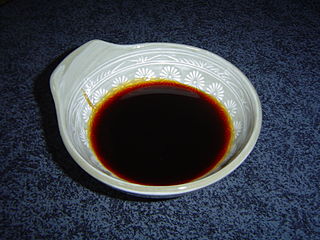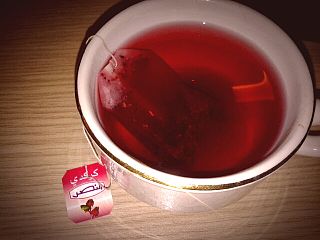 W
WArabic coffee is a version of the brewed coffee of Coffea arabica beans. Most Arab countries throughout the Middle East have developed distinct methods for brewing and preparing coffee. Cardamom is an often-added spice, but it can alternatively be served plain or with sugar.
 W
WArabic tea (Arabic: شاي عربي, romanized: šāy ʿarabiyy,, is a variety of hot teas popular throughout the Arab world. It is commonly served to guests and business partners at meetings and social events, and has been drunk by Arab people for centuries. It is considered to be a healthy drink largely because boiling water kills off most of the bacteria and viruses that would otherwise cause sickness, and some claim that it offers additional medicinal advantages.
 W
WDate honey, date syrup, date molasses or rub is a thick dark brown, very sweet fruit syrup extracted from dates. It is widely used in North African and Middle Eastern cooking.
 W
WHibiscus tea is an herbal tea made as an infusion from crimson or deep magenta-colored calyces (sepals) of the roselle flower. It is consumed both hot and cold. It has a tart, cranberry-like flavor.
 W
WJallab is a type of fruit syrup popular in the Middle East made from carob, dates, grape molasses and rose water. Jallab is very popular in Palestine, Syria, Jordan and Lebanon. It is made mainly of grape molasses, grenadine syrup, and rose water, then smoked with Arabic incense. It is usually sold with crushed ice and floating pine nuts and raisins.
 W
WKuwaiti tea refers to several varieties of tea traditionally served in that country.
 W
WQamar al-Din is an apricot juice or nectar beverage that is typically consumed during the Muslim holy month of Ramadan. It is believed to be from Syria. It was first produced in the Ghouta, where the variety of apricots most suitable for qamar al-din was first grown. Qamar al-din is enjoyed across the Middle East and North Africa as well as in Somalia, though Syrian qamar al-din is still believed to be the best because the variety of apricots most suitable for making qamar al-din grow only in Syria and southwestern Turkey.
 W
WQishr is a Yemeni traditional hot drink made of spiced coffee husks, ginger, and sometimes cinnamon. In Yemen, it is usually drunk instead of coffee because it doesn't need to be roasted.
 W
WSalep, also spelled sahlep or sahlab, is a flour made from the tubers of the orchid genus Orchis. These tubers contain a nutritious, starchy polysaccharide called glucomannan. Salep flour is consumed in beverages and desserts, especially in the cuisines of the former Ottoman Empire, notably in the Levant where it is a traditional winter beverage. An increase in consumption is causing local extinctions of orchids in parts of Turkey and Iran.
 W
WSharbat is an Iranian drink also popular in Turkey, South Asia, Caucasus and the Balkans. It is prepared from fruits or flower petals. It is a sweet cordial, and usually served chilled. It can be served in concentrated form and eaten with a spoon or diluted with water to create the drink. Popular sharbats are made of one or more of the following: basil seeds, rose water, fresh rose petals, sandalwood, bael, hibiscus, lemon, orange, mango, pineapple, falsa and chia seeds.